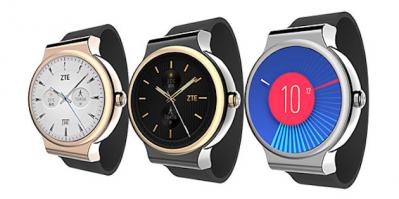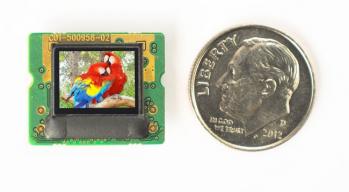Wearable OLEDs - Introduction and Latest Industry News - Page 18
ZTE announces two new AMOLED devices: a smartphone and a smartwatch
ZTE announced two new devices today, both with AMOLED displays. First up is the Axon Watch, which is a smartwatch based on the Chinese TenCent OS (which means it will be sold only in China). It sports a circular 1.4" AMOLED display (400x400) a heart rate monitor, GPS and 4GB of internal memory.

The second device is the Axon Mini - the world's first smartphone that features a force touchscreen. It uses a 5.2" Super AMOLED display - and that's the only information ZTE released at this stage. The company also announced two more Android smartphones - but both use LCD displays.
DisplayMate tests sapphire vs glass in Apple's Watch
A couple of months ago DispalyMate's Raymond Soneira posted a technical review of Apple's Watch Flexible OLED display. The display was found out to be excellent, and Raymond said that "there is absolutely no question that for smart watches, OLED is the only way to go for a great display".

The Watch in DisplayMate's edition used a Sapphire cover, while the cheaper Watch editions use strengthened glass (same one used in the iPhones and iPads). DisplayMate said that sapphire's advantage is that it's virtually scratch-proof, but it also reflects about twice as much ambient light as glass. In a new post, DisplayMate compares two Watch editions (glass vs. sapphire). As you can see above, the different under ambient light is quite dramatic.
Will Apple add SDC as a second flexible OLED supplier for the next-gen Watch?
The first-generation Apple Watch uses a flexible OLED display, exclusively produced by LG Display. New reports say that Apple signed up Samsung Display to be the second flexible OLED supplier for the next-generation Watch.

This is actually quite funny - even before the official launch of the Watch in March 2015, we heard the same report. Later on it was said that Apple decided to make LGD the exclusive flexible OLED display supplier for the Watch 2. And now we're back to the first report with SDC as a supplier.
Reports say LGD to be Apple's exclusive plastic-OLED supplier for the Watch 2
The first-generation Apple Watch uses a flexible OLED display, exclusively produced by LG Display. According to a new report from Korea, Apple decided to make LGD the exclusive flexible OLED display supplier for the second-generation Watch as well.

A few months ago it was reported that Apple signed up Samsung display to be its second plastic-based OLED supplier, but if the new report is true, it decided to keep just one supplier - even though LGD seems to be struggling with production issues which caused Apple to scale back its Watch production.
Oculus VR finally announce the consumer Oculus Rift, which will use two 1080x1200 AMOLEDs
Oculus VR finally unveiled their first commercial/consumer VR HMD, the Oculus Rift which will be released in 2016. The Rift will use two 1080x1200 AMOLED displays to reach a total resolution of 2160x1200. Those AMOLEDs are produced by Samsung.

Oculus VR released several development-kits and prototypes in past years, with different displays. The first one used an LCD, but in the 2nd-gen HMD they adopted a low-persistence AMOLED display - in fact that was the same Super AMOLED display used in the Galaxy Note 3 (complete with the touch layer and all). Later on they switched to a dual-AMOLED design.
AUO demonstrates a 1.3" circular plastic-based flexible AMOLED prototype
AU Optronics demonstrated a new 1.3" Full-circle plastic-based flexible AMOLED panel. The panel features a resolution of 320x320 (257 PPI) and a brightness of 320 cd/m2. The whole panel is less than 0.25 mm thick.

It's not clear how close is this panel for commercialization. AUO recently shifted its focus to wearable OLEDs, and has launched a circular 1.4" glass-based AMOLED display.
IHS: AMOLED displays to be the leading display technology in the smartwatch market in 2015
IHS says that display shipments for smartwatches will grow 250% in 2015 to reach 34 million units, mostly due to the new Apple Watch. IHS says though that shipments will fall in Q4. AMOLED displays will be the leading display technology with 58% of total smartwatch displays shipped in 2015.

Apple's Watch uses 1.34" plastic-based AMOLEDs produced by LG Display (IHS estimates that this display costs $20.5). The Watch will make up 84% of all AMOLED shipments in this market and 49% of total displays.
Ignis raised $14 million in a new financing round, expects True Vision Displays on the market in 2016
IGNIS Innovation has secured $14 million in a new financing round. Ignis will use the new funds to accelerate product development especially the recently announced True Vision Display technology. True Vision Displays use the company's compensation technologies which extend OLED display lifetime and efficiency, and also enable HDR - even on mobile displays.
 CSOT 5.5-inch MaxLife AMOLED prototype
CSOT 5.5-inch MaxLife AMOLED prototype
Ignis further said that is working with partners to develop True Vision Display OLEDs for the wearable, smartphone, automotive, tablet and TV markets. Ignis expects the first products to launch next year.
This is what eMagin's OLED microdisplay VR HMD looks like
OLED Microdisplay maker eMagin recently announced a new VR head mounted display (HMD) that use the company's latest high resolution (2K by 2K) OLED microdisplays and patented optics. Last week eMagin announced it completed development of the new HMD, and here's how it looks like:

As you can see, this is a much more elegant solution compared to most VR headsets on the market which use cellphone-sized OLED displays. The display can be flipped to an up-position (shown in the image above).
eMagin reports Q1 2015 financial results
eMagin, the OLED microdisplay maker, reported their financial results for Q1 2015 - the company generated $6 million in revenue (down from $6.3 from last year) and with higher gross margin and lower expenses, they managed to turn a profit of $300K - after seven quarters of operating losses.
 eMagin XGA096 OLED-XL
eMagin XGA096 OLED-XL
eMagin started to ship their ultra high brightness WUXGA displays, and also started to ship VGA displays globally (these are eMagin's lowest cost displays ever). eMagin also reports advances in direct-patterned OLEDs, and they completed development of its recently announced microdisplay-based HMD and demonstrated it to potential customers.
Pagination
- Previous page
- Page 18
- Next page

